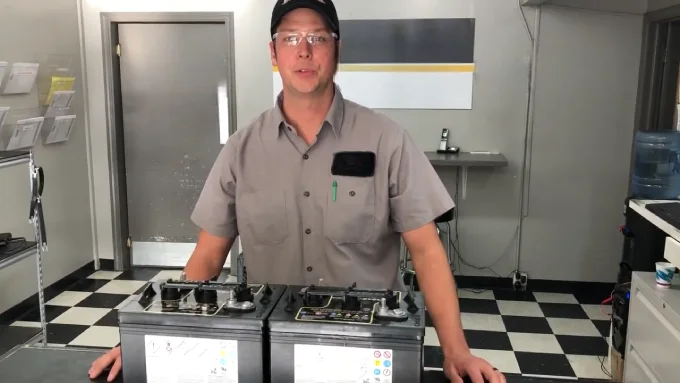Last Updated on April 18, 2023
If you’re a boat owner, RV enthusiast or off-grid power user, you know the importance of having a reliable battery. It’s crucial to have a battery that can withstand deep cycling and provide consistent power for extended periods.
But what about starting? Can you use your deep cycle battery to start your engine? Indeed, you can use a deep cycle battery to start your motor in a pinch.
Through this article, we explore the in-depth answer to this question and provide valuable information on the differences between deep cycle and cranking batteries. So please grab a cup of coffee and let’s dive in.
Can You Use a Deep Cycle Battery For Starting: In-Depth Discussion
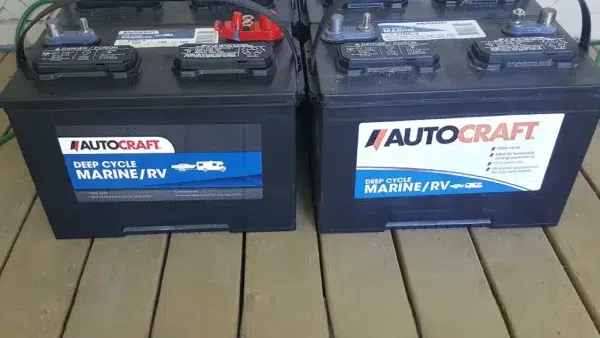
Deep cycle batteries are commonly used in applications that require a steady and consistent power flow over an extended period, but can you use your deep cycle battery to start your car or RV?
The short answer is yes, but it depends on several factors. A deep cycle battery is designed to discharge its energy slowly over an extended period. It typically has thicker plates and more electrolytes than a starting battery.
On the other hand, a starting battery is designed to deliver short bursts of high energy to start an RV engine quickly. It has thinner plates and less electrolyte than a deep cycle battery.
While both types of batteries use lead-acid chemistry, they have different internal designs that make them suitable for different applications. Using a deep cycle battery for starting an RV or vehicle may not provide the necessary cranking amps your engine requires.
However, if you have a small engine or low power requirements, using a deep cycle battery for starting may be advantageous. Deep cycle batteries are known for their durability and long life span compared to traditional starting batteries.
Difference Between Starting and Deep Cycle Batteries
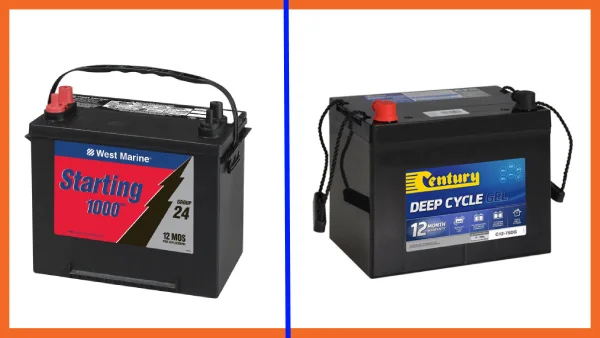
Starting and deep cycle batteries are two different types of batteries designed for specific purposes. While both batteries have some similarities, they also have significant differences.
Construction and Intended Use
The main difference between these two types of batteries is their construction and intended use. Starting batteries are optimized for delivering short bursts of power, while deep cycle batteries are optimized for delivering sustained power over long periods.
While it may be possible to use a deep cycle battery like a starting battery in some cases, it is generally not recommended. Deep cycle batteries do not have the same cranking amp rating as starting batteries, which means they may not be able to deliver enough power to start an engine reliably.
Also, using a deep cycle battery as a starting battery can significantly reduce its lifespan due to the demands placed on it during engine startup.
Battery Power
A starting battery is primarily designed to provide a large burst of power for a short period to start an engine. These batteries typically have a high cranking amp rating (CCA) and can quickly deliver a large amount of current. They are also designed to be recharged quickly by the alternator once the engine runs.
Meanwhile, a deep cycle battery is designed to provide a continuous power flow for a long time. These batteries are commonly used in applications such as RVs, campers, boats, and solar power systems.
Deep cycle batteries have thicker plates than starting batteries, which allows them to withstand repeated charging and discharging cycles without damage.
Pros and cons of using a Deep Cycle Battery for starting
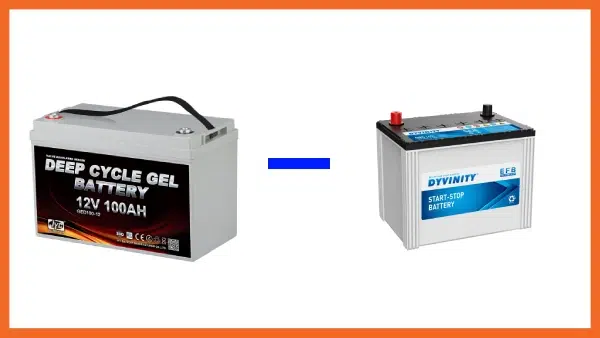
Using a Deep Cycle Battery to start your vehicle can have advantages and disadvantages. Before using a Deep Cycle Battery as a starting battery, here are some pros and cons.
Advantages of using a Deep Cycle Battery for starting
- Durability: Deep cycle batteries are designed to provide long-lasting power, making them ideal for harsh environments or heavy-duty applications.
- Versatility: Since deep cycle batteries are designed to discharge their energy slowly over time, they can be used for starting and powering accessories such as lights, radios, and winches.
- Cost-effectiveness: While deep cycle batteries are more expensive than traditional starting batteries, they also last longer, making them a cost-effective option in the long run.
- Maintenance: Deep cycle batteries require less maintenance than traditional starting batteries since they don’t need to be recharged as often.
Disadvantages of using a Deep Cycle Battery for starting
- CCA Rating: Cold Cranking Amps (CCA) is the measurement used to determine how well a battery will perform in cold temperatures. Deep cycle batteries generally have low CCA ratings than traditional starting batteries, which may make them less effective in colder climates.
- Cranking Amps: While deep cycle batteries can provide ample power over an extended period, they can’t deliver the high cranking amps needed to start an engine quickly.
- Voltage requirements: Some vehicles require specific voltage requirements that may not be met by a deep cycle battery.
- Size and weight: Deep cycle batteries tend to be larger and heavier than traditional starting batteries due to their construction, making them difficult to install or transport.
Using Deep Cycle batteries for Starting: What to Consider?
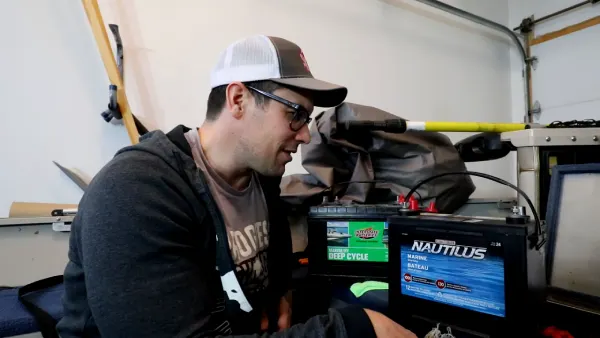
When considering a deep-cycle battery for starting your RV or vehicle, several factors must be considered. These factors include:
Voltage requirements
It’s critical to ensure the deep cycle battery you plan to use has the correct voltage output to start your specific engine or device. For example, if you have a 12-volt system, you need a 12-volt battery.
Using a battery with too low a voltage can damage your engine or device and cause safety hazards. It’s important to note that deep-cycle batteries typically have lower voltage outputs than starting batteries.
This is because they are designed for long-term power delivery rather than short bursts of energy needed for starting engines. Thus, it’s crucial to check the manufacturer’s specifications before using a deep-cycle battery for starting.
CCA Rating
The CCA rating, or Cold Cranking Amps, is important when utilizing a deep cycle battery for starting. This rating measures the battery’s ability to start an engine in cold temperatures. The higher the CCA rating, the better the battery will perform in cold weather conditions.
Deep cycle batteries typically have lower CCA ratings than starting batteries because they are designed to provide sustained power over a longer period rather than short bursts of high power. But, some deep cycle batteries have CCA ratings suitable for starting engines.
When using a deep-cycle battery for starting, you must choose one with a CCA rating that meets or exceeds the requirements of your engine. If the CCA rating is too low, the battery may be unable to start the engine in cold temperatures.
Cranking Amps
Cranking amps (CA) refer to the amount of current that a battery can deliver at 32°F for 30 seconds while maintaining a voltage of at least 7.2 volts.
While deep-cycle batteries are designed to provide a steady power flow over a long time, they may not have enough cranking amps to start an engine efficiently.
Using a deep cycle battery with low cranking amps may result in slow or sluggish starts, damaging your vehicle’s starter motor and other electrical components. Thus, choosing a battery with the appropriate CCA rating and cranking amps your vehicle’s manufacturer requires is essential.
Cold Temperature Performance
Deep Cycle Batteries are not designed for cold temperature performance as they provide a steady and consistent flow of power over an extended period, rather than the sudden burst of power required for starting engines.
One important feature to look for is the battery’s Cold Cranking Amps (CCA) rating. This measures the amount of current that the battery can deliver at 0°F (-18°C) for 30 seconds without dropping 7.2 volts below. A higher CCA rating indicates the battery is better equipped to handle cold weather starts.
Similarities Between Deep Cycle Marine & RV Battery
Though deep cycle marine and RV batteries may seem like two completely different types of batteries, they have quite a few similarities. Each type of battery has been designed to deliver power in remote locations for electrical devices in recreational vehicles, such as boats and RVs.
They are also lead-acid batteries, meaning they use lead plates submerged in sulfuric acid to generate electricity. Also, both marine batteries and RV batteries need to be able to withstand extreme temperatures and the occasional jostling that comes with travel.
As a result, both types of batteries are typically made from durable materials such as lead acid or AGM. Deep cycle marine and RV batteries require regular maintenance to prevent damage and extend their lifespan.
Deep Cycle Marine VS RV Battery: What Are The Differences?
The decision of what battery you should use for your RV can be confusing. You can find many different battery options, but it’s hard to know which one is appropriate.
One crucial question is whether you need a deep cycle marine battery or an RV battery. Let’s take a closer look at the difference between marine and RV batteries:
Weight:
One of the most significant considerations between deep cycle marine & RV batteries is weight. Marine batteries are designed to be used on boats, which means they must withstand the constant movement and vibration of being on the water. As a result, deep cycle marine batteries tend to be heavier than RV batteries.
This extra weight can help provide stability for your boats, but it can also make them difficult to transport and install in your RV. Ultimately, using a marine boat battery on your RV is not recommended since the weight might damage certain parts.
If you’re looking for a battery that’s easy to move around, an RV battery may be a better option. In contrast, a marine battery is the best choice if you need a battery that will last for years.
Voltage Stability:
Voltage stability is essential when choosing a battery for your recreational vehicle (RV) or marine vessel. While both kinds of batteries are designed to provide a reliable power source, they differ in their ability to maintain a stable voltage.
Deep cycle arine batteries are typically better at voltage stability with deep cycle usage, while RV batteries are better at providing starting power. When it comes to voltage stability, marine batteries are the clear winner. This is due to their design, which includes thicker lead plates and a higher number of cells.
As a result, they are better able to withstand the demands of deep cycle usage and provide a more stable voltage. And marine batteries are typically sealed, meaning they are less likely to suffer from electrolyte loss. This helps to improve their voltage stability further.
Battery Power:
RV deep cycle batteries are designed for deep cycling and provide long-term power, but they differ in battery capacity and discharge rate. They have a lower capacity but can be discharged slower. This makes them better suited for powering RV appliances such as refrigerators and televisions.
Deep cycle marine batteries have higher ability and can be discharged faster than RV batteries. This makes them ideal for powering boat accessories such as trolling motors and fish finders.
Tolerable Humidity:
Marine batteries can withstand high humidity and salt air without corroding. On the other hand, RV batteries need to tolerate low humidity and excessive heat without drying out, but they can handle high-level vibration, which is often found on RVs.
Therefore, the tolerable humidity for a lithium marine battery is much higher than that of an RV AGM battery (such as an Optima deep cycle battery). When choosing a battery for either application, it is vital to select one that can withstand the extreme conditions of the environment in which it will operate.
Cost:
The cost of batteries is one area where marine and RV owners differ. Deep cycle marine batteries tend to be more pricey than RV batteries. This is because marine batteries are designed to withstand more challenging conditions, such as being continually exposed to salt water.
In contrast, RV batteries are typically only used for short periods, so they don’t need to be as rugged. This results in a lower average cost. It’s essential to do your research before buying to make sure there are no exceptions. But in general, marine batteries will cost more than RV batteries.
These factors distinguish the difference between RV and marine batteries. To choose the right battery for your application, it is essential to consider the conditions of its use.
Can RV batteries be used for marine applications?
RV and marine batteries work similarly, so RV batteries can be used for marine applications. RV batteries are designed to provide a long-lasting and durable power source that can quickly provide enough power to your marine applications.
Due to their larger size and greater amp-hour ratings, RV batteries provide more energy storage capacity than standard marine batteries. These larger RV battery banks usually allow users more flexibility when selecting a charging profile.
They provide greater reliability when running multiple electrical components simultaneously over extended periods. Thus, many people use RV batteries for marine applications, which work in all cases.
Do deep-cycle batteries have cranking amps?
Deep cycle batteries, such as RVs, boats, and solar power systems, are typically used for long-term power supply. Unlike traditional starting batteries, deep cycle batteries are not designed for starting engines and do not have too many high-cranking amps.
They are optimized for deep discharges and have a slow discharge rate, making them ideal for powering appliances or electronics over an extended period. While some deep cycle batteries may have a small amount of cranking amps, it is generally much lower than a standard car battery.
How many amps is a 12-volt deep cycle battery?
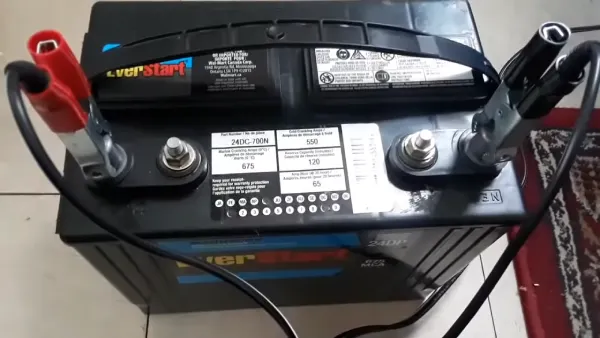
The number of amps a 12-volt deep cycle battery can produce depends on various factors, such as its size, type, and state of charge. Generally, a 12V deep cycle battery can produce up to 600 amps of current, although this may vary depending on the specific model.
It is important to note that the amp-hour (Ah) rating is a more important consideration than the maximum current output, as it measures the battery’s overall capacity to supply energy over time.
A larger battery with a higher Ah rating will be able to power devices for a longer period before requiring recharging or replacement.
Start Smart: Choosing the Proper Battery for Optimal Performance
Using a deep cycle battery for starting your RV and vehicle is possible but not always recommended. While deep cycle batteries have advantages such as longer lifespan and better performance in off-grid applications, they are not designed for the high current draw required by starting an engine.
Also, you must consider the voltage requirements, CCA rating, cranking amps, and cold temperature performance of the battery before attempting to use it as a starting battery.
In the end, while using a deep cycle battery for starting may be possible in some cases, it is generally recommended to stick with a dedicated starting battery for optimal performance and longevity.

